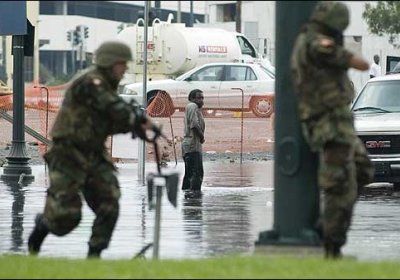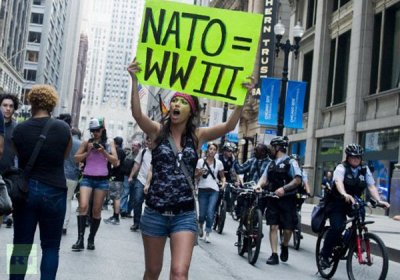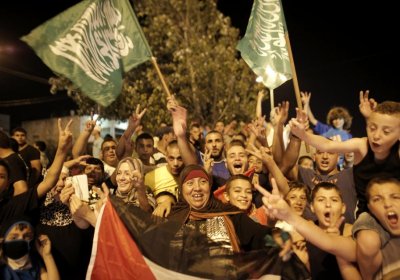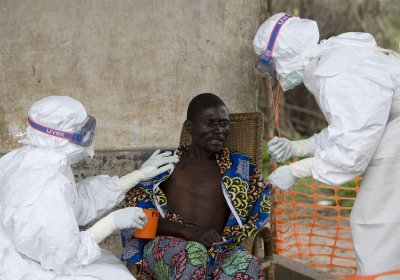The appointment of dictator Prayuth Chan-ocha as prime minister by his hand-picked military parliament was such an unsurprising non-event that Prayuth did not even bother to attend. The so-called “vote” was unanimous.
Prayuth has set himself up as Thailand’s “Supremo”, placing himself in charge of all important posts. This harks back to the dark old days of the military dictatorships in the 1960s and 1970s.
As acclaimed writer Wat Wanyangkoon said: “The junta is detritus left over from the Cold War.”
World
It’s all over the news: images of police in military gear pointing war zone weapons at unarmed Black people with their hands in the air. These scenes made my heart race in an all-too-familiar way.
I was devastated for Mike Brown ― the unarmed Black teenager shot dead by police on August 9 ― his family and the people of Ferguson. Almost immediately, I closed my eyes and remembered the same fear for my own family that pangs many times over a given year.
Claims and counter claims by Imran Khan’s Pakistan Tehreek Insaaf (PTI), Mullah Tahir Qadri’s Pakistan Awami Tehreek (PAT) and the governing party of Pakistan, the Muslim League Nawaz (PMLN), of who contacted the army chief first for “mediation” or “facilitation” have puzzled the vast majority of people in Pakistan.
Ecuador's pro-US neoliberal president Lucio Gutierrez was ousted in 2005. Since then, relations between Ecuador and the United States have deteriorated, with the Andean nation’s increasing rejection of US hegemony.
The government of Rafael Correa, first elected in 2006, has broken from the neoliberal doctrines Washington has imposed on Latin America. It has embraced regional integration, moving closer to its neighbours and further away from the US.
Diplomatic cables published by WikiLeaks show how hard the US fought to control Ecuador's future post-Gutierrez.
The barriers are going up across south Wales. Huge steel fences block off buildings, including Cardiff castle. Roads are closed. Children are promised a shorter school day or maybe no school at all. Rail services are disrupted.
All so that a group of politicians and military men can meet in a country hotel outside Newport for a September 4 and 5 NATO summit to plan more of the military interventions that have contributed to a world now more seriously threatened by major wars than at any time since 1945.
Ecuador turns military buildings into hospitals, parks
Ecuador will cut its military by 51% over the next 10 years, teleSUR English said on August 28. Ecuadorian defence minister Maria Fernanda Espinosa announced the army´s 516 units would be cut to 252.
The measure aims to optimise Ecuador's military presence nationally. “We know now what we have, how to maintain it, and what we need,” she told the press.
The Scottish Socialist Party is pushing a “yes” vote in Scotland’s September 18 referendum on independence.
SSP national spokesperson Colin Fox is part of the Advisory Board of Yes Scotland, the cross-party campaign for Scottish independence. He wrote a pamphlet with a vision for what an independent Scotland could look like, called “For a Modern, Democratic Republic”.
According to John Kenneth Galbraith, the economist who chronicled the Great Crash of 1929, the Great Depression did not actually end. Rather, it was swept away by World War II.
Something eerily similar seems to be happening with the global economy since the onset of the global financial crisis (GFC) six years ago.
The vice-chairperson of the US Federal Reserve, Stanley Fischer, said: “The global recovery has been disappointing … year after year we have had to explain from mid-year why the global growth rate has been lower than predicted as little as two quarters back.”
Activities were held across South Africa on August 16 to mark the second anniversary of the Marikana massacre, in which 34 striking mineworkers were slain by state security forces.
The killings occurred one week into a strike over pay by several thousand rock drill operators at the Lonmin-operated platinum mine in Marikana.
Despite the massacre, workers remained on strike. One month later, they won a settlement that met a large part of their pay claim.
Thousands marched in Staten Island, New York City, on August 23 to protest against the police murder of an unarmed Black man, Eric Garner, in July.
The action was led by Reverend Al Sharpton, who has been outspoken against police brutality since the killing.
The marchers were inspired by the mass protests in Ferguson, Missouri, against the murder of unarmed Black teenager Michael Brown by police. They took up the chant of the Ferguson protesters ― “Hands Up! Don’t Shoot!”
Palestinians in Gaza took to the streets on August 26 in celebration. After 51 days of merciless bombardment by the Israeli military, an open-ended ceasefire between Palestinian resistance groups and Israel was announced that appears likely to last for at least the immediate future.
During the assault, homes, hospitals, shops, agricultural infrastructure and schools were pulverised. About 2100 Gazans were killed. An estimated 80% of these were civilians, including more than 500 children.
As the deadly disease Ebola spreads throughout West Africa, some in the West have been engaging in fear-mongering and racism. Others are seeing this deadly outbreak as a golden chance to profit off desperation.
But the high death toll is caused by the intersection of Ebola and poverty.
Ebola is a hemorrhagic fever with symptoms that include headache, vomiting and diarrhoea, as well as the signature symptoms of internal and external bleeding. It is caused by a virus that is spread through contact with fluids such as saliva, urine, blood and semen.
- Previous page
- Page 397
- Next page







